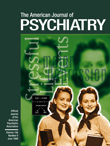Schizophreniform Disorder: Exception Proves the Rule
To the Editor: Schizophreniform disorder refers to schizophrenia-like psychoses with a duration of less than 6 months. The validity of this condition as a distinct diagnostic entity has been questioned (1). This may be at least in part because of the variability in how we define this disorder. In DSM-IV, a provisional diagnosis of schizophreniform disorder can be made when an episode lasts for less than 6 months. Alternatively, schizophreniform disorder is diagnosed as “definite”—i.e., without the “provisional” qualification—when a patient with an episode of schizophrenia-like illness has “recovered” within 1 to 6 months (DSM-IV). The recovery required to make the diagnosis is not adequately defined. The following case emphasizes the need for clarification.
As part of an ongoing prospective follow-up study of patients with first-episode psychotic disorders, we have been conducting longitudinal reevaluations of diagnoses. Among 115 such patients, 15 met an initial (4-week assessment) diagnosis of schizophreniform disorder—provisional. Upon reevaluation at 6 months, 14 patients were rediagnosed with schizophrenia on the basis of their fulfilling the duration criteria of 6 or more months of illness (including prodromal, active, and residual phases).
The one exception was Ms. A, a 37-year-old single Caucasian woman who was a college graduate and worked as a nutritional therapist. She was admitted for a 2-week history of auditory hallucinations, referential and persecutory delusions, anxiety, sleeplessness, and agitation. Following treatment with risperidone (up to 4 mg per day), she gradually improved. She continued to experience mild ideas of reference for 2 to 3 months; then her symptoms completely subsided. She returned to full-time work and functioned well without any symptoms while on a low dose (2 mg) of risperidone. Two years later, she enrolled in a study of gradual medication withdrawal under close supervision. Auditory hallucinations returned within a week after her last dose of risperidone. Upon reinstitution of her medication, her symptoms gradually improved over the following month.
Ms. A had clearly met DSM-IV criteria for schizophreniform disorder. This diagnosis would have continued to be our best estimate had she not had a trial of medication discontinuation. Thus, hers was not a “true” recovery, and the possibility of persistence of the illness, or the vulnerability for reemergence of symptoms, was only uncovered by the attempt to discontinue medication. We suggest that a diagnosis of “schizophreniform—provisional” should only be changed to schizophreniform without qualification if a patient is asymptomatic without ongoing treatment for psychotic symptoms. How long after discontinuation of medication should one assign a diagnosis of schizophreniform without qualification? Only prospective studies in which antipsychotic medication-free remission is observed will address that question.
1. Strakowksi SM: Diagnostic validity of schizophreniform disorder. Am J Psychiatry 1994; 151:815–824Link, Google Scholar



